Basic Policy and Promotion System
Since its foundation, the Tsubaki Group has endeavored to achieve sustainable growth by fulfilling its corporate social responsibilities and at the same time contributing to society through its business activities. This is truly the practical implementation of the Mission stated in our corporate philosophy (to advance the art of moving beyond expectations), and we believe it will directly contribute to the realizing the SDGs* that represent the challenges currently facing the global community.
In April 2020, we established a Basic Policy on Sustainability with the aim of systematically promoting these activities. Under this policy, the Tsubaki Group as a whole will work together to create innovative technologies and solve social issues. We will simultaneously promote mutual communication with our stakeholders and contribute to the realization of a sustainable society in our role as a manufacturing company.
* SDGs: An abbreviation of Sustainable Development Goals; the United Nations’ international goals for achieving a sustainable and better world by 2030.
Basic Policy on Sustainability
Basic Policy on Sustainability
The Tsubaki Group will contribute to the creation of a sustainable society through business activities based on the Tsubaki Spirit, its corporate philosophy, while improving its corporate value through technological innovation and aiming to remain a company that society needs. In addition, we will enhance management transparency and deepen relationships of trust through communication with our stakeholders.
Established: April 2020
Promotion System
The Tsubaki Group established the Sustainability Committee, chaired by the COO, in order to further strengthen and accelerate our initiatives targeting the implementation of our Basic Policy on Sustainability. The Sustainability Committee discusses, formulates, and comprehensively manages the Group-wide implementation policies and important themes according to the information provided by each committee such as the Environmental, Quality, and Health and Safety and Sustainability Promotion Managers Meeting. The Board of Directors receives regular reports from the Sustainability Committee on the status of activities and key performance indicators (KPIs) and supervises and reviews overall management activities.
Under this promotion system, we will strengthen our initiatives by identifying priority matters (material issues) and KPIs from the perspective of the global supply chain. We will also strive for good communication with stakeholders both inside and outside the company.
Sustainability Promotion System Chart
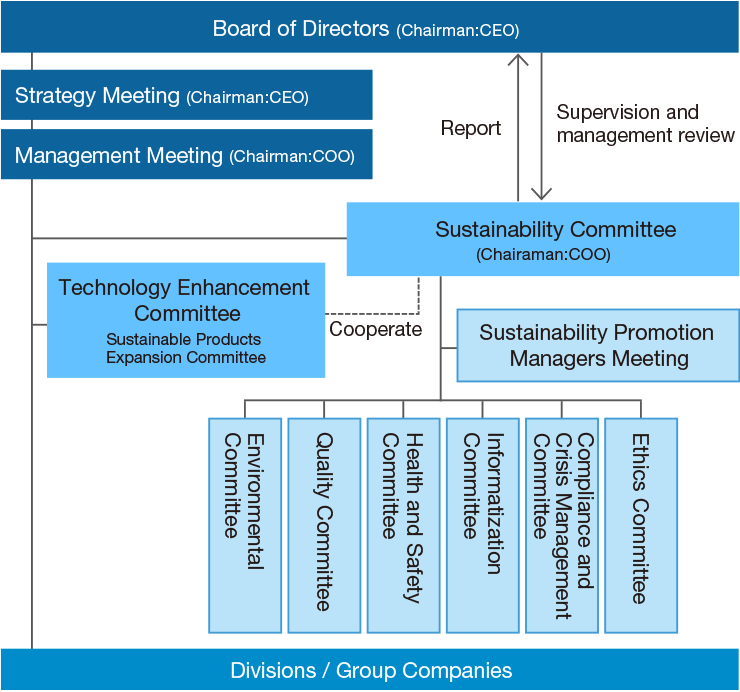
| Chairman | Members | Number of meetings | |
|---|---|---|---|
| Sustainability Committee | COO | Executive officers in charge of business operations Secretariat: Executive officer in charge of sustainability Executive officer in charge of human resources |
3 per year |
| Sustainability Promotion Managers Meeting | Executive officer in charge of sustainability |
Managers of sustainability-related departments Secretariat: Sustainability Promotion Department |
3 per year |
Other Policies on Sustainability
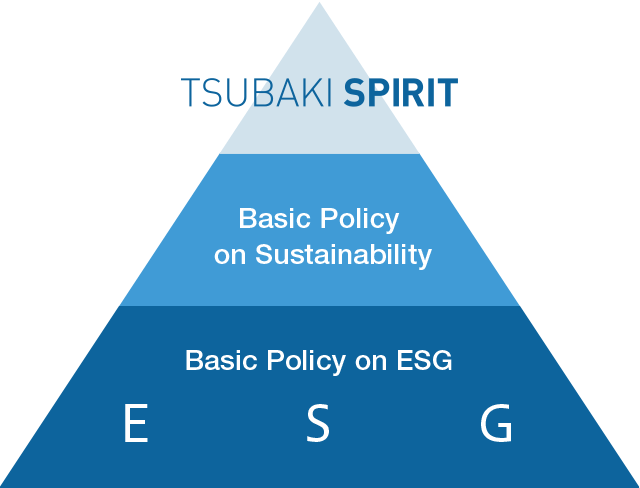
Environment (E)
Society (S)
Participation in Initiatives/Outside Evaluations
To promote sustainability, we participate in the following initiatives:
United Nations Global Compact
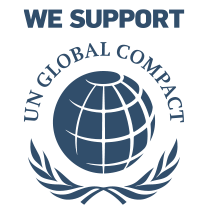
In April 2022, we signed the United Nations Global Compact (UNGC) advocated by the United Nations and joined its local network, the Global Compact Network Japan (GCNJ).
UNGC is a global initiative that calls on participating companies and organizations to exercise responsible and innovative leadership as exceptional members of society to achieve sustainable growth. We are working to implement ESG-focused management in support of the Ten Principles advocated by the UNGC in the four areas of human rights, labor, environment, and anti-corruption.
The Ten Principles of the UN Global Compact
| Human Rights | Principle 1: | Businesses should support and respect the protection of internationally proclaimed human rights; and |
|---|---|---|
| Principle 2: | make sure that they are not complicit in human rights abuses. | |
| Labour | Principle 3: | Businesses should uphold the freedom of association and the effective recognition of the right to collective bargaining; |
| Principle 4: | the elimination of all forms of forced and compulsory labour; | |
| Principle 5: | the effective abolition of child labour; and | |
| Principle 6: | the elimination of discrimination in respect of employment and occupation. | |
| Environment | Principle 7: | Businesses should support a precautionary approach to environmental challenges; |
| Principle 8: | undertake initiatives to promote greater environmental responsibility; and | |
| Principle 9: | encourage the development and diffusion of environmentally friendly technologies. | |
| Anti-Corruption | Principle 10: | Businesses should work against corruption in all its forms, including extortion and bribery. |
TCFD

In March 2022, we endorsed the recommendations of the Task Force on Climate-Related Financial Disclosures (TCFD). In keeping with their recommendations, we are working to disclose information on both the risks and opportunities that our business will face as a result of climate change from the perspectives of strategy, risk management, and governance, among other aspects. In addition, as a member of the TCFD Consortium in Japan, we engage in exchanges of opinions with various industries.
CDP
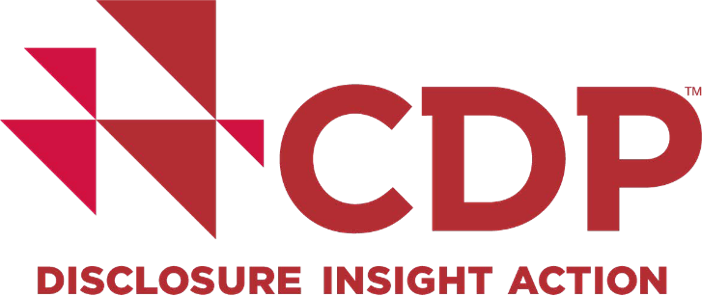
The CDP is a leading global ESG evaluation institution that evaluates greenhouse gas (GHG) emissions reduction initiatives and strategies for tackling climate change which are implemented by countries and cities around the world. We started participating in 2020 and received a Climate Change Score of B in 2024.
Eco-First Program
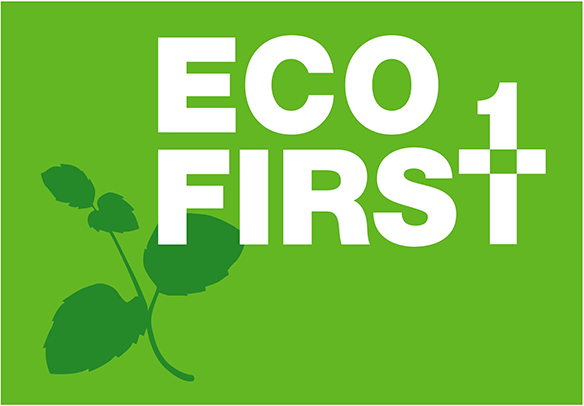
The Eco-First Program was established by the Japanese Ministry of the Environment in 2008. In this program, the Minister of the Environment certifies advanced environmental leaders in their respective industries through innovative, original, and industry-leading business practices. We made commitments to the Minister of the Environment on such as measures to combat global warming, process waste appropriately, promote recycling, and were certified as an Eco-First company in April 2023.
SBT
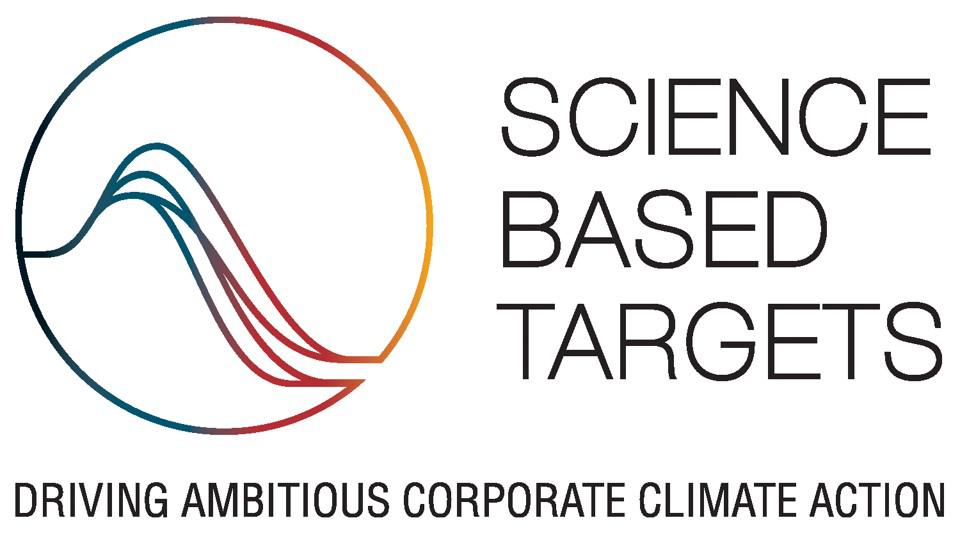
Science Based Targets (SBT) is an initiative to certify the CO2 emissions reduction targets of companies that are in line with the goal of the Paris Agreement of limiting global warming to 1.5°C above pre-industrial levels. We were certified in May 2023 for our CO2 reduction targets through 2030.
Health & Productivity Management Outstanding Organization 2025
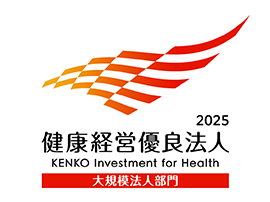
The Certified Health & Productivity Management Outstanding Organizations Recognition Program is a system which presents awards to outstanding organizations that are carrying out health management jointly with the Ministry of Economy, Trade and Industry (METI) and Nippon Kenko Kaigi. Our company was first certified in 2024, and was recertified in 2025.


